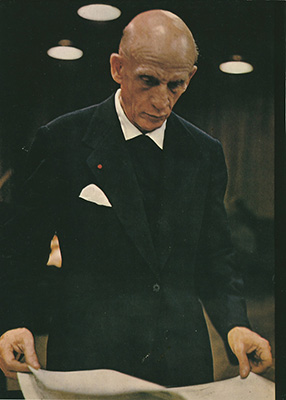Also known as:
Δημήτρης Μητρόπουλος
More People of Greece
More Topic Categories
Related Destinations
Dimitris Mitropoulos (01/03/1896 - 02/11/1960)
 Dimitris Mitropoulos was a Greek conductor, pianist and composer, who lived most of his life in the United States of America.
Dimitris Mitropoulos was a Greek conductor, pianist and composer, who lived most of his life in the United States of America.He was born in 1896 to middle class parents, who made sure he received excellent education. He attended school at Varvakion School in Athens and later studied music at the Conservatory of Athens. He completed his music studies in 1919, receiving a piano diploma with distinction. Being offered a scholarship by the Conservatory, he furthered his studies in Brussels, where he had composition and organ classes. He worked as a repetiteur from 1922 till 1924, as well as assistant at the Berlin Unter den Linden State Opera.
In 1924 he returned to Greece and accepted a position as a conductor in Athens, at the Hellenic Conservatory Orchestra, the Concert Society Orchestra and the Athens State Orchestra. His debut outside Greece was in 1930, as a guest conductor at the Berlin Philharmonic Orchestra. He later appeared (as a conductor) at the Orchestre de Paris, the Santa Cecilia Academy Orchestra, the Moscow State Philharmonic, the Leningrad State Philharmonic, the Milan Theatro alla Scala Orchestra, and many others. He first appeared in the USA in 1936, along with the Boston Symphony Orchestra. From 1938 to 1949, he was the main conductor of the Minneapolis Symphony Orchestra.
From 1951 to 1957, he became the principal conductor and musical director of the New York Philharmonic. The next year, he shared the position with Bernstein, who since 1958 took over; Mitropoulos only appeared as a guest conductor of the New York Philharmonic since then. In 1960, he died in Milan, while rehearsing Mahler’s Third Symphony, after a heart attack.
Apart from his career in orchestra, he was also very active in operas. While in Italy, he conducted opera extensively, while from 1954 onwards, he was also the principal conductor of the Metropolitan Opera in New York. During his 35-year-long career, Mitropoulos made over 2500 appearances as a conductor of symphonic concerts, opera performances and chamber music concerts. His repertoire included works of all music eras, baroque, classical, romantic and contemporary. Before his work as a conductor, he composed a number of musical pieces; starting at a very young age, he completed a total of 48 pieces, including orchestra, chamber music, piano, choir, voice and orchestra, etc. He quit composing before he was 30 years old and devoted himself to conducting.
He was the first Greek composer who abandoned the functional tonal system and preferred to follow modern trends, such as atonality and the twelve-tone technique of Schonberg. He was considered a champion of modern music, equal to the members of the Second Viennese School. He also managed to boost Leonard Bernstein’s interest in conducting performances of Mahler’s symphonic works.
See Also:
 Athens Photos
Athens Photos
 Santorini Photos
Santorini Photos
 Crete Photos
Crete Photos
 Meteora Photos
Meteora Photos
 Corfu Photos
Corfu Photos


